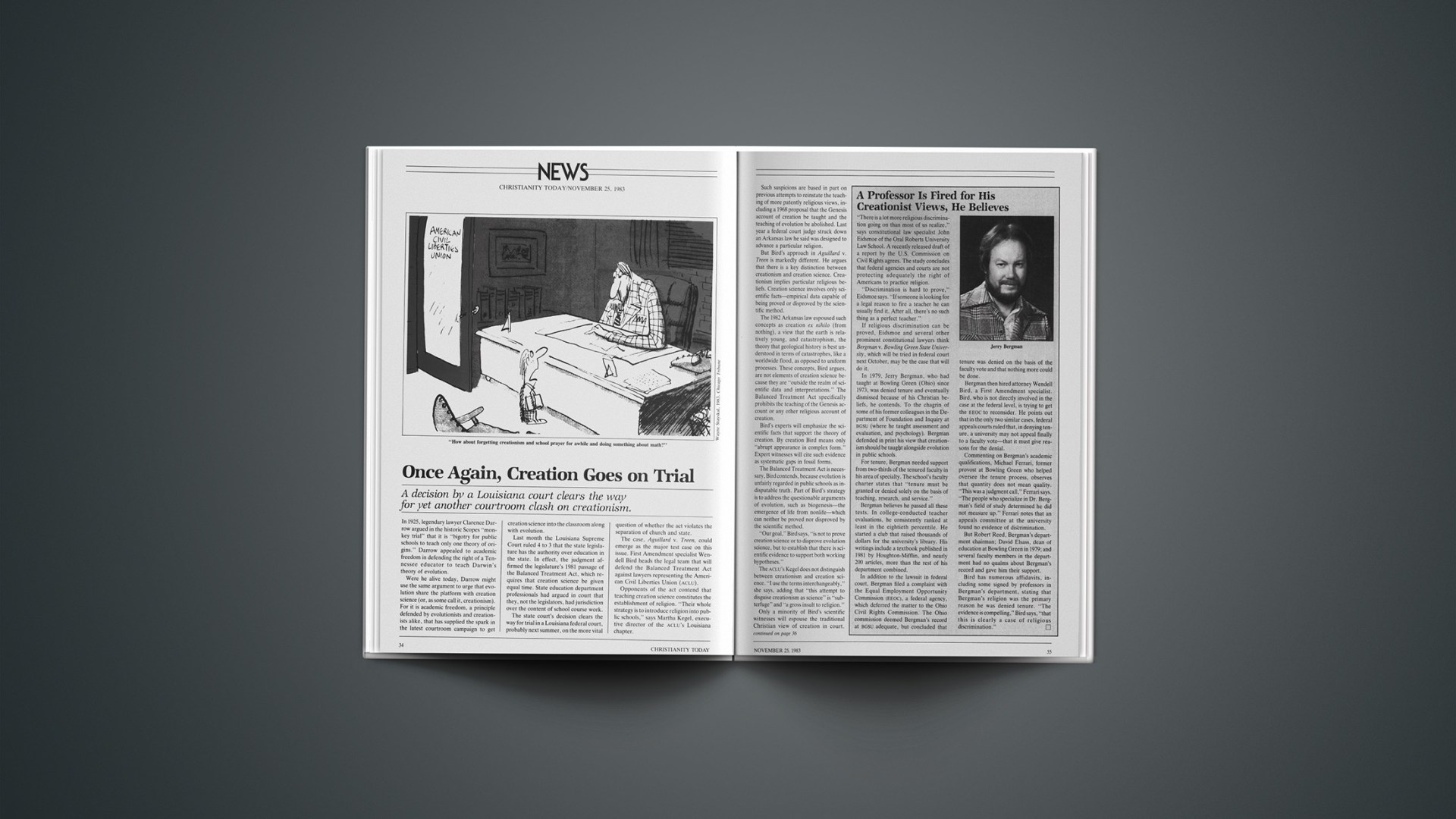A decision by a Louisiana court clears the way for yet another courtroom clash on creationism
In 1925, legendary lawyer Clarence Darrow argued in the historic Scopes “monkey trial” that it is “bigotry for public schools to teach only one theory of origins.” Darrow appealed to academic freedom in defending the right of a Tennessee educator to teach Darwin’s theory of evolution.
Were he alive today, Darrow might use the same argument to urge that evolution share the platform with creation science (or, as some call it, creationism). For it is academic freedom, a principle defended by evolutionists and creationists alike, that has supplied the spark in the latest courtroom campaign to get creation science into the classroom along with evolution.
Last month the Louisiana Supreme Court ruled 4 to 3 that the state legislature has the authority over education in the state. In effect, the judgment affirmed the legislature’s 1981 passage of the Balanced Treatment Act, which requires that creation science be given equal time. State education department professionals had argued in court that they, not the legislators, had jurisdiction over the content of school course work.
The state court’s decision clears the way for trial in a Louisiana federal court, probably next summer, on the more vital question of whether the act violates the separation of church and state.
The case, Aguillard v. Treen, could emerge as the major test case on this issue. First Amendment specialist Wendell Bird heads the legal team that will defend the Balanced Treatment Act against lawyers representing the American Civil Liberties Union (ACLU).
Opponents of the act contend that teaching creation science constitutes the establishment of religion. “Their whole strategy is to introduce religion into public schools,” says Martha Kegel, executive director of the ACLU’s Louisiana chapter.
Such suspicions are based in part on previous attempts to reinstate the teaching of more patently religious views, including a 1968 proposal that the Genesis account of creation be taught and the teaching of evolution be abolished. Last year a federal court judge struck down an Arkansas law he said was designed to advance a particular religion.
But Bird’s approach in Aguillard v. Treen is markedly different. He argues that there is a key distinction between creationism and creation science. Creationism implies particular religious beliefs. Creation science involves only scientific facts—empirical data capable of being proved or disproved by the scientific method.
The 1982 Arkansas law espoused such concepts as creation ex nihilo (from nothing), a view that the earth is relatively young, and catastrophism, the theory that geological history is best understood in terms of catastrophes, like a worldwide flood, as opposed to uniform processes. These concepts, Bird argues, are not elements of creation science because they are “outside the realm of scientific data and interpretations.” The Balanced Treatment Act specifically prohibits the teaching of the Genesis account or any other religious account of creation.
Bird’s experts will emphasize the scientific facts that support the theory of creation. By creation Bird means only “abrupt appearance in complex form.” Expert witnesses will cite such evidence as systematic gaps in fossil forms.
The Balanced Treatment Act is necessary, Bird contends, because evolution is unfairly regarded in public schools as indisputable truth. Part of Bird’s strategy is to address the questionable arguments of evolution, such as biogenesis—the emergence of life from nonlife—which can neither be proved nor disproved by the scientific method.
“Our goal,” Bird says, “is not to prove creation science or to disprove evolution science, but to establish that there is scientific evidence to support both working hypotheses.”
The ACLU’s Kegel does not distinguish between creationism and creation science. “I use the terms interchangeably,” she says, adding that “this attempt to disguise creationism as science” is “subterfuge” and “a gross insult to religion.”
Only a minority of Bird’s scientific witnesses will espouse the traditional Christian view of creation in court. “Less than half hold a young earth view,” Bird says. “Among our experts are Protestants, Catholics, Jews, Buddhists, even agnostics.”
In interrogations prior to the 1982 Arkansas trial, an ACLU lawyer was surprised to discover that biochemist W. Scot Morrow, who supports the teaching of creation science, is an agnostic and an evolutionist. Morrow explains, “They find it inconceivable that a capable biochemist who is not a committed Christian could advocate what I am advocating.”
“I can see scientific merits in both arguments,” Morrow says. “But the question of origins is not limited to science. It is a metaphysical question, and if only one metaphysical model is presented, the First Amendment establishment clause is violated. Students should be given all the facts so they can sort things out for themselves.”
With this observation, Morrow touches on the apparently irresolvable philosophical controversy that resides in the eye of the storm. The ACLU contends that creation science is religion and therefore cannot be neutral. Bird responds, “What the ACLU calls neutrality is actually a religion of secularism.”
Bird contends that creation science and evolution science are equally nonreligious, and that both are used to an equal extent to support alternative religious beliefs.
In Aguillard v. Treen, both sides will cart in their best chemists, biologists, physicists, educators, and philosophers. The ACLU’s experts, led by noted astronomer Carl Sagan, will maintain that no one who espouses creationism can be seriously regarded as a scholar.
The experts will discuss such topics as interdependent structures in organisms, the reliability of dating methods, and the second law of thermodynamics. Bird’s goal is to have this esoteric, academic debate shifted from the courtroom to the classroom.










